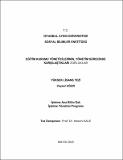Please use this identifier to cite or link to this item:
http://hdl.handle.net/11547/1886Full metadata record
| DC Field | Value | Language |
|---|---|---|
| dc.contributor.author | Uğur, Veysel | - |
| dc.date.accessioned | 2019-05-13T08:12:26Z | - |
| dc.date.available | 2019-05-13T08:12:26Z | - |
| dc.date.issued | 2015 | - |
| dc.identifier.uri | http://hdl.handle.net/11547/1886 | - |
| dc.description.abstract | Bir taraftan eğitim kurumları yöneticiliğine olan talep her geçen gün azalmakta iken, diğer taraftan eğitim kurumu yöneticilerinden beklentiler sürekli artmaktadır. Kısıtlı mali imkânlarla kurumun fiziki eksiklerini gidermeye çalışırken aynı zamanda eğitim öğretim kalitesini artırmaya çalışmak, yöneticileri zorlamaktadır. Eğitim kurumu yöneticileri bilgi, beceri, birikim ve deneyimleriyle eğitim kurumlarını her alanda ileriye götürme konusunda birinci dereceden sorumlu kişilerdir. Bu nedenle eğitim kurumu yöneticilerinin, yönetim sürecinde karşılaştıkları sorunların belirlenmesi ve yaptıkları işi severek sürdürmeleri için bu sorunların giderilmesi oldukça önem arz etmektedir. Bu çalışmanın amacı eğitim kurumu yöneticilerinin, yönetim sürecinde karşılaştıkları sorunları belirlemek ve bu sorunlara çözüm yolları bulmaktı. Bu amaç doğrultusunda elde edilen verilerin analizleri sonucunda araştırmacı birtakım sonuçlara ulaşmıştır. Araştırmanın evrenini, 2014-2015 eğitim öğretim yılında İstanbul ili Bağcılar İlçesinde ilkokul, ortaokul ve liselerinde görev yapan eğitim kurumu yöneticileri oluşturmaktadır. Araştırmanın örneklemini ise Bağcılar ilçesinde 37 ilkokul, 30 ortaokul ve 25 lisede görev yapan eğitim kurumu yöneticilerinden basit tesadüfi örnekleme yoluyla seçilmiş araştırmaya katılmaya gönüllü 92 eğitim yöneticisi oluşturmaktadır. Bu araştırmada, eğitim kurumu yöneticilerinin, yönetim sürecinde karşılaştığı zorlukları belirlemek amacıyla Kulu (2008) tarafından geliştirilen “Okul Yönetiminde Karşılaşılan Güçlükler” anketi kullanılmıştır. Veriler, Sosyal Bilimler İçin İstatistik Programı 17 ( SPSS 17 )’ ye aktarılmış ve istatistiksel analizler bu programla gerçekleştirilmiştir. Araştırma verilerinin değerlendirilmesinde Frekans ve Yüzdeler, Bağımsız Örneklemler için t- testi ve Tek Yönlü Varyans Analizi kullanılmıştır. Tek Yönlü Varyans Analizi sonuçlarının anlamlı çıkması durumunda işlem sonrası testleri Lsd testi aracılığıyla gerçekleştirilmiştir. Denencelerin test edilmesinde gözlenen sayısal farkların ‘‘ anlamlı ’’ ya da ‘‘ anlamsız ’’ olduğu.05’lik hata payı dikkate alınarak belirlenmiştir. Yapılan analizler sonucunda eğitim kurumunda yönetici olarak görev yapmakta olan eğitim kurumu yöneticilerinin yönetim sürecinde karşılaştıkları sorunlar ile cinsiyet, yaş, kıdem, medeni durum, mesleki kıdem, çalışılan okul türü, görevi değişkenleri arasında istatistiksel açıdan anlamlı bir ilişki olduğu görülmüştür. | tr_TR |
| dc.language.iso | tr | tr_TR |
| dc.publisher | İSTANBUL AYDIN ÜNİVERSİTESİ SOSYAL BİLİMLER ENSTİTÜSÜ | tr_TR |
| dc.subject | Eğitim | tr_TR |
| dc.subject | Eğitim kurumu | tr_TR |
| dc.subject | Eğitim yöneticisi | tr_TR |
| dc.subject | Yönetim | tr_TR |
| dc.subject | Education | tr_TR |
| dc.subject | İnstitute of education | tr_TR |
| dc.subject | Management of Educational Institute | tr_TR |
| dc.subject | Management | tr_TR |
| dc.title | EĞİTİM KURUMU YÖNETİCİLERİNİN, YÖNETİM SÜRECİNDE KARŞILAŞTIKLARI ZORLUKLAR | tr_TR |
| dc.type | Thesis | tr_TR |
| dc.description.abstractol | On one hand the demand to management of Educational Institute which has been decreasing day by day, on the other hand, the expectations from managers of educational institute constantly increasing. The managers who try to overcome the physical deficiencies with limited financial opportunities, at the same time seeking to increase the quality of education and teaching, forces the managers. Educational institution managers with their knowledge, skills and experience, are responsible in the first degree to bring educational institutions forward in every aspect. Therefore, identifying the problems of the managers of educational institutions faced in the management process and troubleshooting these problems in order to be able to assure they can continue their work enthusiasm is of great importance. The aim of this study was to identify the problems that the educational institution managers face in the management process and to find solutions to these problems. As a result of analysis of the data obtained in this purpose, the researcher have reached a number of conclusions. The Managers of Educational Institutes working at Primary, Secondary and High Schools district of Bagcılar in Istanbul 2014-2015 Academic Year, constitutes the universe of the research. As to the sample of research, from the Managers of Institution of Education working 25 at high schools, 30 secondary schools, 37 primary schools in Bagcılar district, 92 managers of education who are volunteers to join the research by the way of basic accidental illustration is formed. In this research, to specify the difficulties which the Directors of Educational Institute come across, the survey of the difficulties come across at school managements developed by Kulu (2008) was used. The datas transferred to Statistical Programme for Social Sciences 17 and the statistical analyses come true with this programme. At the evaluating process the datas of research, Frequencies and Percentages, For Independent Samples, T- Test and One Way Variance Analysis were used. If oneway analysis of variance test are executed via LSD (Least Singnificant Difference) tests. To decide if the numerical difference observed in the hypothesis testing is “significant” or “meaningless, the error margin was considered as .05.In consequence of analysis, statistically, there is a meaningful relation between the managers working at Instıtute of Education come across the problems of management process and gender, age, length of service, marital status, professional seniority, the type of school and duty factors. | tr_TR |
| dc.publisher.firstpagenumber | 1 | tr_TR |
| dc.publisher.lastpagenumber | 82 | tr_TR |
| Appears in Collections: | Tezler -- Thesis | |
Files in This Item:
| File | Description | Size | Format | |
|---|---|---|---|---|
| 391641.pdf | Tez dosyası | 2.88 MB | Adobe PDF |  View/Open |
Items in DSpace are protected by copyright, with all rights reserved, unless otherwise indicated.
